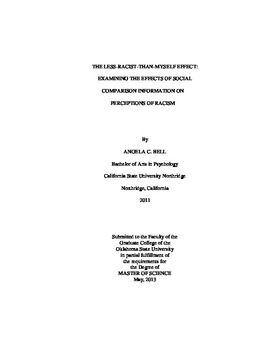| dc.description.abstract | It is well established that people evaluate themselves more favorably than they evaluate the average person. For example, people report they have higher IQs, are better drivers, and are more qualified for jobs relative to the average person. This biased social comparison is known as the Better-Than-Average effect. Even more interesting, this positivity bias even works when the comparison other has responses that are identical to the individual's own response, an effect known as the Better-Than-Myself effect. The present research extends the BTME to the area of prejudice, to investigate the judgment process that occurs when people are asked to estimate their own prejudices and see if people tend to deny their own racist behaviors. In Study 1, participants indicated they were less racist than a comparison other, even when that comparison other engaged in identical behaviors as that of the participant, thereby demonstrating a "less-racist-than myself" effect. The present research of Study 2 extended the findings of Study 1, and sought to investigate the role of consensus comparison feedback, that was hypothesized to significantly weaken the Less-Racist-Than-Myself effect when social consensus was low. Contrary to the hypotheses, neither the consensus manipulation nor other moderating variables were found to impact the self enhancement bias. These results provide insight into situations where people engage in seemingly racist behavior but deny that they are racist. According to the present work, this denial does not seem to stem from the fact that such perpetrators define racism differently than their audience, or are affected by whether or not their peers are in agreement with their behaviors. Instead, such perpetrators appear to suffer from a positivity blind spot that allows them to see racism in others, but not in themselves, regardless of consensus. Results and implications are discussed in terms of how the present research was the first to incorporate the study of prejudice in these self-enhancement effects, and the difficulty of debiasing such effects. | |
